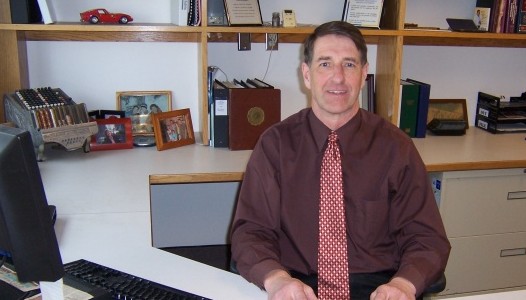I love the way engineers consider the world and the way engineering education challenges the conventions of rote memorization. I remember one story of an engineering student who took a test, on which was the question, “how do you measure the height of a building using a barometer?” The instructor was looking for a single, specific answer (compare the barometric pressure at ground level with the pressure at the top of the building), but this student was convinced there were countless ways to approach the problem—including everything from using geometry to compare the lengths of the building and barometer’s shadows to selling the barometer to the building’s architect—creative problem solving is just what it’s all about.” – Ron Oscarson
Ron Oscarson’s Spokane County office displays some truly unique treasures: vintage cameras, military antiques and mechanical devices that may not serve much purpose in today’s technological age, but still manage to captivate the imagination of anyone fascinated with how things work.
“Look at this one,” he said, reaching for a large, metal box that was lined with coins on the corner of his desk. He pressed one of the 99 typewriter-style round keys on the top—the one that read “51”—and out popped exactly $.49 in coins. “They said it was an old cash register and were going to throw it away,” he said, explaining how he saved the antique automatic change machine from an old County storeroom.
To say the Spokane County Facilities Director is passionate about engineering would be an understatement. He talks about the way things function and the possibilities in the world with an inspiring wonder that seems ideal for someone who has worked so closely with future engineers for more than two decades. He’s been a fixture on Gonzaga’s School of Engineering and Applied Science’s Design Advisory Board since its inception in the 1990s; however, this year, Ron Oscarson will be stepping down.
“I’ve decided to retire,” he said.
In his role on the Design Advisory Board for the Center for Engineering Design and Entrepreneurship, Oscarson has seen hundreds of design projects presented by senior Gonzaga engineering students. Comprised of engineering and computer science professionals from all disciplines in both private and public sectors, members of the board are assigned to student teams to help them on their journey toward their professional careers. The board meets on campus four times annually to review student reports and presentations, requiring a relatively short commitment of time and yielding a tremendous impact.
“We are there to listen and ask questions,” he explained. “We also help identify projects out in the community that might be a good fit for GU students.” When Oscarson joined the board, he recalls there being only three or four mechanical engineering projects, which fall under his specialty. “Today,” he said, “there are pages and pages of projects—16 are mechanical engineering, so you can see how much it has grown.”
Oscarson has been impressed over the years by what he has seen Gonzaga engineering students accomplish. Most notable for him have been the “Gonzaga Without Borders” projects. He was riveted by a group of students who were working to develop water filtration systems that could be built from ceramics and sawdust with tools easily found in remote places.
“Those projects can change the world,” he said.
For Oscarson, partnering with Gonzaga was a natural fit, based on the University’s prominence in the Spokane community. He also has a very special personal connection, being that his father, Ralph Oscarson, graduated from Gonzaga in 1951.
“My father was an accountant,” he said, adding, “so I just had to go in a different direction.”
As Oscarson prepares for yet another new direction, he is excited for what retirement may hold. He and his wife are admitted ski bums, looking forward to more time skiing on the mountain in the coming year. His presence on the design advisory board will certainly be missed, especially by fellow longtime member Les Bohush, who has also served with the board since its inception and is joined by engineering professionals from Eastern and Western Washington and North Idaho.
Alumni and friends of the Gonzaga School of Engineering and Applied Science are encouraged to volunteer to be part of these important projects that can have far-reaching effects for future engineers and computer scientists as well as communities around the world. If you are interested in volunteering with the design advisory board, please contact Toni Boggan, Academic Director of the Center for Engineering Design and Entrepreneurship at boggan@gonzaga.edu or 509-313-3913.
